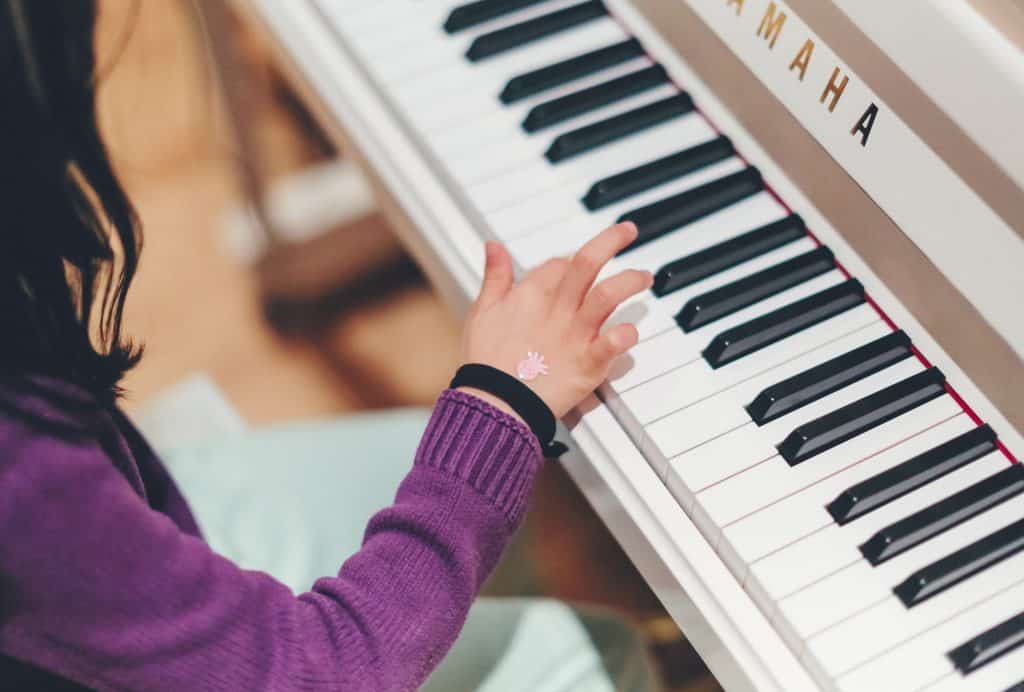Many people ‘wish’ they could play the piano. Many people start, then other factors get in the way. Some people achieve their goals.
If every new pianist knew how to make piano practice fun, all of the time, every learner would fulfil their musical ambitions. This article covers all you need to enable better understanding of what ‘fun’ piano practice is for you. It provides insights into growing your initial interest and developing it into rewarding long term engagement, enjoyment and enrichment. It supports you in creating an enjoyable environment every time you are at your piano. Read on to discover how the brain likes to learn, the snares of end gaining, the impact of self-belief, and some top tips.
🧠How the Brain Likes to Learn
Humans are naturally curious. They take pleasure in solving problems, but not just any problems. They need to be just the right sort of problem; not too easy and not too hard! Too easy, and there is no sense of accomplishment, too hard, and there is no sense of reward and achievement.
What does this have to do with making piano practice fun?
Work in small chunks to enjoy more frequent successes
The more small achievable goals you set and reach in a practice session, the more enjoyable your practice will become. The Skoove app is very useful here because it breaks your practice into bite size chunks for you, increasing your sense of reward and enjoyment. You will notice in Lean on Me, the right-hand lesson is split into two sections. The song is also taught in a five part series, further breaking down learning to offer regular achievement and successes.
Play this lesson now; consciously congratulate yourself at each stage and appreciate your learning.
Allow time to enjoy each stage
In our busy, goal focused 21st Century lives, time is not always taken to relish each stage. Learning is in danger of becoming a tick box exercise:
I know that, done! Now I must move on as fast as possible.
Compare this to how children repeat the same task simply because it is delightful. From this you learn the value of finding joy in repetition. You might repeat a section of a song. You might revisit previous lessons. Both of these are so valuable because they build fluency and ease in your playing as well as enjoyment and fulfilment in your practice.
Playing previously learnt songs for enjoyment also provides perspective. Students tend to look at how far they have to go in their learning journey rather than how far they have come. Looking back provides a sense of satisfaction.
Let’s do that now. Pick one of your favourite songs to revisit. As you play it, take note of how much easier it is this time than it was the first time. Remember too, if you feel ‘rusty’ that is also totally normal. Even professionals have to work to maintain their repertoire. Revisiting these songs, even when you are feeling rusty, will embed your learning further, and there is no pressure, the Skoove app will wait for you. Here is one of my favourite songs from the beginner series, you can play it or choose your own.
If you are looking for a further resource to support building a repertoire, this article provides all you need.
End Gaining
The more obstinately you try to learn how to shoot the arrow for the sake of hitting the goal, the less you will succeed’ – Eugen Herringal – Zen and the Art of Archery p46
This quotation applies to all learners. The more focus there is on the end outcome, the less presence and awareness there is in the moment. This has a negative impact on enjoyment, on your ability to explore the music and on opportunities to grow that all important curiosity that stimulates engagement.
You can read more about end gaining here.

The Impact of Self-belief
Learners who are aware of the impact of their internal dialogue are in a powerful position to create exactly the fun supportive engagement they need to sustain their practice.
Two types of dialogue
Internal conversations can be performance enhancing or performance interfering. Depending on the perspective you choose to take you will either be encouraging or frustrating your progress. Imagine two scenarios; it is a piano practice session, the learner makes a mistake:
Scenario 1 – Reaction
Oh, that is so frustrating, why do I keep doing that? I am just not getting this. Surely I should be able to do this now.
Scenario 1 – Outcome
This learner will soon be very tempted to walk away from the piano, and their self belief will suffer.
Scenario 2 – Reaction
Oh, how interesting, this area is still tripping me up. Well, the point of practice is to unearth mistakes and learn from them, so let me see how I can understand this in a different way.
Scenario 2 – Outcome
This learner has spiked their curiosity, they have positively acknowledged their mistakes by viewing them as an important means to support learning. The learner has chosen a position of control by considering different perspectives. As a result, they will stay at the piano longer, make some improvements and increase their self belief.
Growing Self-belief
As this example shows, a learner’s internal dialogue will have a huge impact on their level of enjoyment. This highlights the importance of feeding self belief.
It is time for some more playing. The learning aim here is to listen closely to what you are saying to yourself. There is no need for harsh judgement. Simply notice what you are saying and if it is likely to interfere with your learning simply replace it with a thought that will enhance your learning. The Skoove app will listen and wait for you so take your time to replace any interfering thoughts with enhancing thoughts.
What do you notice? Did you spot that negative commentary kills curiosity and with it, enjoyment. Stress levels also increase during negative commentary, while fun decreases.
reduce mental interferences that inhibit the full expression of human potential – Barry Green – The Inner Game of Music
💡15 Top Tips
1) Keep in mind your original inspiration for learning
Most people are inspired to learn because they are touched by music and want to experience that creativity and expression for themselves. Many then fall into the trap of prioritising accuracy above all else. This diminishes enjoyment. A balanced solution is to layer practice, one layer for accuracy and the other for expression and communication. Giving yourself the opportunity to experience both will increase fun because you are connecting regularly with the initial reason you chose to learn piano. Before long you will be able to do both at the same time. Your playing will be fluent and expressive and you will feel you are achieving your goals.
2) Acknowledge your achievements
Take time to look at how far you have come. If you are not satisfied with your learning rate, remember that some practice strategies are more efficient than others. More on the art of Piano Practice, here.
3) Support yourself
Be kind to yourself, take time to observe how you like to practice, when you like to practice, what you need to do and find a way to align these.
Do you work better in the morning or the evening? Do you need peace to concentrate?
4) Ease into it
What activity will put you in a creative mood ready to explore all the rich sounds and colours in your piano? Many people like to listen to some of their favourite songs first, others exercise or meditate first – what works best for you? Perhaps you like to ease into practice with some improvisation, Learn to Improvise Blues Music with Skoove.
5) Celebrate when you have achieved a goal
This can be a small or large celebration. It might be a coffee break when you have cracked a hard section in a piece. It might be sharing some music with family or friends.
6) Keep it social
One of the most motivating parts of learning an instrument is sharing the experience with others. Planning to meet with other learners to play your music is a great way to focus practice. You will also be encouraged as you observe others learning. These shared experiences enrich learning through listening and through talking to and watching other learners.
7) Separate it from your other stresses
Life is busy and the worst situation for piano is for it to become another one of the things you have to ‘do’. This is your hobby, protect it. The great thing about Skoove is that you can learn at your own rate. Enjoy this!
8) Keep it short
Many ten minute practice sessions are lost because pianists are looking for a long sustained time slot. This is a real shame because regular ten minute sessions are more valuable than one long session. Short sessions are frequently, more fun, as there is less expectation. A short ten-minute session can be viewed as enjoyable breakout time from the rest of your day.
Let’s do it now, ‘Canon In D‘ by Johann Pachelbel is a well loved and recognised piece. The Skoove app combines your learning here using this inspiring music to teach technique. Take a ten-minute break to enjoy this learning.
9) Play daily
There is no way around it, daily sessions, even short ones, are more fun, you develop a momentum which gives results faster.

10) Incorporate your strengths
This is so valuable for all learners and is supported by the Skoove app. If you like to learn by ear, do that, if you prefer to read the music or watch the keyboard you can do those. Start from your strengths and when you become confident using those you can move on to developing the other skills.
11) Set meaningful goals
Know how you like to work, some prefer to have many different songs and tasks to learn at one time, others prefer to focus on just one. Make sure your goals are your goals, how you like to work rather than how you think you should work.
12) Listen deeply
Tune into the music and its message. Many learners fall into the trap of listening very superficially to accuracy. Try this out, the Skoove app provides rich backing tracks, play this piece and focus your listening on the band in combination with your part.
13) Know when to move on
Occasionally there is a piece that is not a good fit. In these cases considering moving onto a more appealing piece can be best.
14) Write a journal
Keeping a log of your learning and what interests you speeds up retention through the process of reflecting. Give it a go, it is another creative outlet where you can write, draw and log your thoughts and learning.
15) Involve other sources
A vast amount of knowledge is available. As well as learning music via the Skoove app you might read articles, explore other genres of music, watch films about musicians. All these activities will enrich your experience and feed your enjoyment in practice. Have a look at this article, Connecting your Keyboard to your iOS device.
Picking yourself back up
Even after doing all the above, there may be times when you need to reinvigorate your practice to make it fun again. These can help:
Learning happens in stages, sometimes there is a plateaux, keep doing what you are doing and you will soon be on the next level!
Professionals don’t practice until they get it right, they practice until they can’t get it wrong. You might like to try this or you might like to embrace the luxury that makes amateur musicians the envy of many professionals. You get to keep piano as a hobby. You play what you want, when you want and how you want. If you want to know more about professional pianists read The Best Female Pianists.
Avoid placing too much importance on talent. Lack of talent is a favourite excuse and it robs learners of the control needed to craft a fun practice session. Why not read the Benefits of Playing the Piano for the Brain. Music is a joy and a benefit which everyone ought to have access to.
Mistakes are part of learning, in fact they show you what your fingers need more help with. Embrace mistakes with light-heartedness. Never feel you need to apologise for mistakes – you are learning, they are part of the process!
Put all your attention into creating lovely sounds and beautiful tones. Music can be totally accurate and yet totally unmoving.
Feed your curiosity by finding enjoyment in the details. Rather than being overwhelmed by details, explore them and learn how they work together to make this beautiful thing we call music.
What is ‘fun’ in piano practice?
It is not an exaggeration to say that there are as many variations of ‘fun’ piano practice as there are pianists. One sure way of deciphering what ‘fun’ is for you is to ask yourself. You know best.
What steps can I take to make this session fun?
This great question prompts personalised creative ideas. These may be different day to day, or they may stay with you for your whole learning journey.
Happiness comes from within. ― Brian Weiss
And…fun is a state of mind
‘Fun’ has many definitions. Those who look for ‘fun’ in new places will soon find fun in challenge, repetitions, questioning thinking, achievement, satisfaction, expression and sharing music.
If learning the piano was easy, everyone would be able to play. It is right to expect challenge; the brain is not captivated by easy. Music is complex and being able to play the piano is worth every moment you dedicate to learning it.
Innovative Fun
Many aspects of the Skoove app are aligned with creative and enjoyable learning and practice. To find out more follow this link where you can even sign up for 25 free lessons. You can also read more about learning piano with an app here. Wishing you the very best for your piano journey!
Author of this blog post:

Roberta Wolff started piano lessons at the age of five and is still enjoying learning! Currently, she teaches piano pedagogy and performance pedagogy at post graduate level in the UK. Her other work includes running a private teaching practice for students of all ages and abilities and creating learning and practice resources. Roberta loves writing as a means to supporting others on their piano journey.

